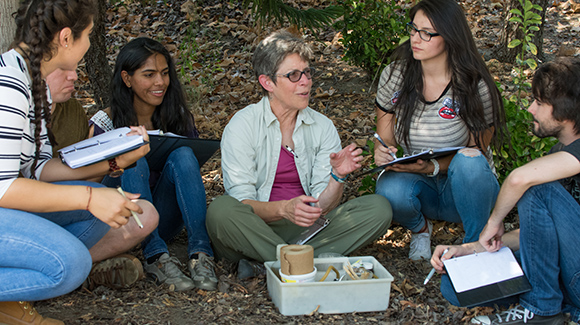
(Photo Credit: Chaffey College)
For most college students, a lab is a protected space far from the elements in which to explore concepts and develop skills in a particular field. But at Chaffey College in Rancho Cucamonga, they’ve taken a new approach that removes the boundaries between classroom instruction and real life learning with their innovative Living Lab. What started as an exploration has become a multi-year grant funded project to provide students with hands-on learning in many disciplines.
Just over a year ago the school began considering the implementation of a living lab. The original plan was to focus primarily on building controls, a great hands-on educational opportunity for students to grasp the connection between the temperature in a classroom and the learning they do in that classroom.
But Theodore Younglove, dean of the School of Mathematics and had bigger plans. He wanted to maximize the concept on campus. To that end, he convened a symposium last year to bring together instructors from across the curriculum to present what they are doing in the classroom to enhance instruction using physical elements of the campus. His hope was to demonstrate the good work already being done and then seek grant funding to increase the school’s capacity as a living lab.
It worked. Professors from a number of departments shared the ways in which the school’s buildings, landscape, and energy infrastructure create opportunities for hands-on education among other topics.
“The students absolutely love it. They have so many questions,” said Dr. Mark Padilla. The Chaffey College physics professor uses the school’s central plant as a physics lab to illustrate many of the ideas they study in class such as fluid flow and systems efficiency. “It’s a goldmine for physics in action he says,” he said.
Biology professor Sandra Collins uses the Chaffey College Preserve and other outdoor spaces to connect classroom work to fieldwork. The living lab “beats what we can do in the classroom with paper, pen, books, etc.” Collins said.
The benefits to students go beyond a particular area of study. Research shows that students who engage in well-designed laboratory experiences guided by qualified faculty develop high level problem-solving and critical-thinking skills.
“There’s so much here that Chaffey provides for a hands-on learning environment for students and that’s what’s really helped me with my success,” said Krissy Dominguez, a former Chaffey College student and current University California, Riverside Ph.D. candidate. “It really provided a more realistic, hands-on setting for how it’s going to be in a career as a biologist. It’s hands-on. It’s real world,”
The Living Lab emphasis on science, technology, engineering and math (STEM) is intentional. Hispanic and low-income students are underrepresented as graduates in these fields. Chaffey College’s newly awarded Title III HSI STEM and Articulation funding will support those populations while strengthening transfer and success rates.
Over the next five years, the new grant will fund the expansion of the College’s Living Lab, the provision of additional student support, and use of an innovative predictive modeling approach to help increase student success.
The Living Lab improvements include the creation of an on-campus makerspace, a workshop with equipment like 3D printers for students to experiment with new technologies in the process of completing their coursework.
But hands-on experience and excitement don’t guarantee student success. That’s why Younglove included supplemental instruction, support centers, financial literacy, and transfer planning as a part of the grant proposal. Predictive modeling will help determine what kinds of help particular students need to be successful.
Younglove is dedicated to the continued growth and improvement of the program and will bring instructors together with a second symposium scheduled for this April.

